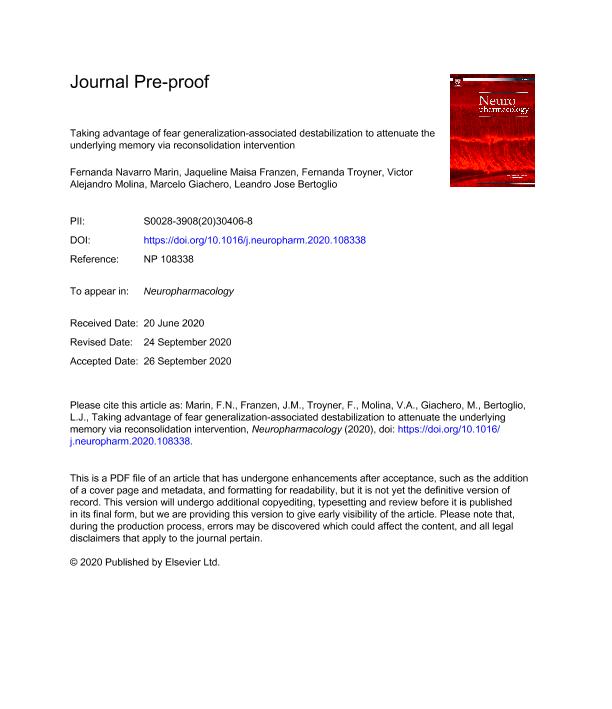Artículo
Taking advantage of fear generalization-associated destabilization to attenuate the underlying memory via reconsolidation intervention
Navarro Marin, Fernanda; Franzen, Jaqueline Maisa; Troyner, Fernanda; Molina, Victor Alejandro ; Giachero, Marcelo
; Giachero, Marcelo ; Bertoglio, Leandro Jose
; Bertoglio, Leandro Jose
 ; Giachero, Marcelo
; Giachero, Marcelo ; Bertoglio, Leandro Jose
; Bertoglio, Leandro Jose
Fecha de publicación:
12/2020
Editorial:
Pergamon-Elsevier Science Ltd
Revista:
Neuropharmacology
ISSN:
0028-3908
Idioma:
Inglés
Tipo de recurso:
Artículo publicado
Clasificación temática:
Resumen
Upon retrieval, an aversive memory can undergo destabilization and reconsolidation. A traumatic-like memory, however, may be resistant to this process. The present study sought to contribute with a strategy to overcome this potential issue by investigating whether generalized fear retrieval is susceptible to destabilization-reconsolidation that can be pharmacologically modified. We hypothesized that exposure to a context that elicits moderate generalization levels would allow a malleable memory state. We developed a fear conditioning protocol in context A (cxt-A) paired with yohimbine administration to promote significant fear to a non-conditioned context B (cxt-B) in rats, mimicking the enhanced noradrenergic activity reported after traumatic events in humans. Next, we attempted to impair the reconsolidation phase by administering clonidine (CLO) immediately after exposure to cxt-A, cxt-B, or a third context C (cxt-C) neither conditioned nor generalized. CLO administered post-cxt-B exposure for two consecutive days subsequently resulted in decreased freezing levels in cxt-A. CLO after cxt-B only once, after cxt-A or cxt-C in two consecutive days, or independently of cxt-B exposures did not affect fear in a later test. A 6-h-delay in CLO treatment post-cxt-B exposures produced no effects, and nimodipine administered pre-cxt-B exposures precluded the CLO action. We then quantified the Egr1/Zif268 protein expression following cxt-B exposures and CLO treatments. We found that these factors interact to modulate this memory destabilization-reconsolidation mechanism in the basolateral amygdala but not the dorsal CA1 hippocampus. Altogether, memory destabilization can accompany generalized fear expression; thus, we may exploit it to potentiate reconsolidation blockers' action.
Archivos asociados
Licencia
Identificadores
Colecciones
Articulos(IFEC)
Articulos de INST. DE FARMACOLOGIA EXPERIMENTAL DE CORDOBA
Articulos de INST. DE FARMACOLOGIA EXPERIMENTAL DE CORDOBA
Articulos(INCYT)
Articulos de INSTITUTO DE NEUROCIENCIAS COGNITIVAS Y TRASLACIONAL
Articulos de INSTITUTO DE NEUROCIENCIAS COGNITIVAS Y TRASLACIONAL
Citación
Navarro Marin, Fernanda; Franzen, Jaqueline Maisa; Troyner, Fernanda; Molina, Victor Alejandro; Giachero, Marcelo; et al.; Taking advantage of fear generalization-associated destabilization to attenuate the underlying memory via reconsolidation intervention; Pergamon-Elsevier Science Ltd; Neuropharmacology; 181; 108338; 12-2020; 1-11
Compartir
Altmétricas



